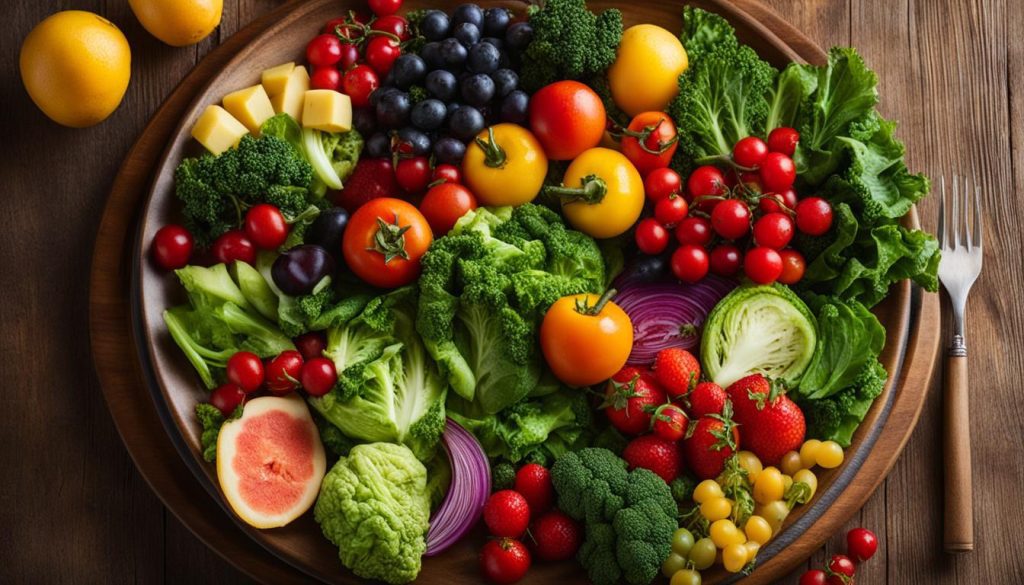Colorectal cancer is a prevalent and potentially life-threatening disease. Taking proactive measures to prevent colon cancer is essential for maintaining good health. By incorporating a few effective steps into your daily routine, you can significantly reduce your risk. In this guide, I will share valuable tips on how to prevent colon cancer and promote overall well-being.
How to Prevent Colon Cancer
- Regular screenings for colorectal cancer are crucial for early detection and treatment.
- A diet rich in vegetables, fruits, and whole grains can lower the risk of colon cancer.
- Engaging in regular exercise and maintaining a healthy weight are important factors in preventing colon cancer.
- Quitting smoking and limiting alcohol consumption contribute to reducing the risk of colon cancer.
- Consult with your healthcare provider regarding the potential benefits of vitamins, minerals, and other preventive measures.
Get Screened for Colorectal Cancer
Regular screenings for colorectal cancer are crucial for early detection and treatment. The American Cancer Society recommends starting screenings at age 45 for individuals at average risk. Screening tests can detect cancer before signs and symptoms develop and can also identify and remove precancerous growths (polyps) in the colon or rectum. Talk to your healthcare provider to determine when to start screening and which tests are appropriate for you.
There are several screening options available, including:
Fecal Occult Blood Test (FOBT) or Fecal Immunochemical Test (FIT)
These tests detect blood in the stool, which may be an early sign of colon cancer. They are done at home and involve collecting small samples of stool and sending them to a laboratory for analysis.
Colonoscopy
This is considered the gold standard for colon cancer screening. A colonoscopy allows the doctor to examine the entire colon and rectum using a long, flexible tube with a camera on the end. If polyps are found during the colonoscopy, they can be removed during the procedure.
Sigmoidoscopy
This procedure involves examining the lower part of the colon and rectum using a flexible tube with a camera. It is similar to a colonoscopy but does not reach the entire colon.


It is important to discuss the different screening options with your healthcare provider to determine the best approach for you. By getting screened for colorectal cancer, you can increase the chances of early detection and improve the chances of successful treatment.
Eat a Healthy Diet
One of the key steps in preventing colon cancer is maintaining a healthy diet. Research has consistently shown that a diet rich in vegetables, fruits, and whole grains can significantly reduce the risk of developing colon cancer. These foods are high in fiber, which plays a crucial role in promoting healthy digestion and preventing the formation of cancer-causing substances in the colon.
It is also important to reduce the consumption of red meat and processed meat, as these have been linked to an increased risk of colorectal cancer. Instead, opt for lean sources of protein like fish and poultry, and include plant-based protein sources such as beans and lentils in your diet.
Incorporating these dietary habits can go a long way in reducing your risk of colon cancer and promoting overall health and well-being. Remember to consult with a healthcare professional or a registered dietitian for personalized dietary recommendations and guidance.
Engage in Regular Exercise
Physical activity plays a crucial role in reducing the risk of colon cancer. Engaging in regular exercise, such as brisk walking, jogging, or cycling, can have significant health benefits. Research suggests that individuals who are physically active have a lower risk of developing colorectal cancer and polyps compared to those who lead sedentary lifestyles.
Exercise helps to regulate bowel movements and reduces the time it takes for waste to pass through the colon, which can decrease the exposure of the colon lining to harmful substances. Additionally, physical activity helps to control weight, boost the immune system, and improve overall gut health, all of which contribute to reducing the risk of colon cancer.


It is recommended to engage in at least 150 minutes of moderate-intensity aerobic exercise or 75 minutes of vigorous-intensity aerobic exercise per week, along with muscle-strengthening activities at least two days a week. Moderate-intensity activities include brisk walking, swimming, or cycling, while vigorous-intensity activities include running, aerobic dancing, or playing sports like tennis or basketball.
Physical Activity and Colon Cancer Risk
Several studies have shown that regular physical activity can significantly reduce the risk of colon cancer. The exact mechanisms behind this protective effect are not fully understood, but it is believed that exercise helps to regulate hormone levels, improve insulin sensitivity, and reduce chronic inflammation, all of which may play a role in preventing the development of colon cancer.
In conclusion, incorporating regular physical activity into your lifestyle is a vital step in preventing colon cancer. Whether it’s going for a walk, hitting the gym, or participating in a favorite sport, staying active can have significant long-term benefits for your colon health and overall well-being.
Maintain a Healthy Weight
One of the key factors in reducing the risk of colon cancer is maintaining a healthy weight. Research has shown that being overweight or obese increases the risk of developing colon cancer, particularly in men. Therefore, adopting a healthy lifestyle that includes proper diet and regular exercise is crucial.
By focusing on consuming a balanced diet rich in fruits, vegetables, and whole grains, and by limiting the consumption of red and processed meats, you can help reduce your risk of colon cancer. Additionally, engaging in regular physical activity and avoiding sedentary behavior can further lower your risk.
Why is a healthy weight important?
A healthy weight not only reduces the risk of colon cancer but also contributes to overall colon health. Excess weight can lead to chronic inflammation and insulin resistance, which are known risk factors for colon cancer. By maintaining a healthy weight, you can help regulate your body’s inflammatory response and insulin levels, reducing the risk of developing this type of cancer.
To achieve and maintain a healthy weight, it’s important to adopt a long-term approach that includes sustainable changes in diet and exercise. Consulting with a healthcare professional or a registered dietitian can provide personalized guidance and support on how to make these changes effectively.


Maintaining a healthy weight is an important part of reducing the risk of colon cancer. By adopting a healthy lifestyle that includes a balanced diet and regular physical activity, you can significantly contribute to your overall well-being and lower your risk of developing this type of cancer.
Quit Smoking to Reduce Colon Cancer Risk
Smoking tobacco is not only harmful to your lungs but also increases your risk of developing colon cancer. Multiple studies have shown a strong link between smoking and an elevated risk of colorectal cancer. If you’re a smoker, quitting is one of the most important steps you can take to reduce your risk.
Smoking cessation has numerous health benefits, including decreasing the likelihood of developing various cancers, heart disease, and respiratory conditions. When it comes to colon cancer, quitting smoking can significantly lower your risk and improve your overall well-being.
If you’re struggling to quit on your own, don’t hesitate to seek help and support. There are many resources available, such as nicotine replacement therapies, counseling, and support groups, that can increase your chances of successfully quitting. Remember, it’s never too late to quit smoking and start protecting your health.
Limit Alcohol Consumption
Alcohol consumption has been associated with a higher risk of colorectal cancer. To reduce the risk of colon cancer, it is best to avoid or limit alcohol intake. The American Cancer Society recommends no more than 2 drinks per day for men and 1 drink per day for women. Following these guidelines can help protect your colon health and lower the chances of developing colon cancer.
Excessive alcohol consumption can lead to inflammation and damage to the cells in the colon, increasing the risk of cancer development. By limiting alcohol intake, you can reduce this risk and support a healthy colon. It is important to note that even moderate alcohol consumption has been linked to an increased risk, so it is best to practice moderation or abstain from alcohol altogether.
To better understand the impact of alcohol on colon health, it is essential to consult with your healthcare provider. They can provide personalized advice and guidance based on your individual health profile and lifestyle. By making informed decisions and adopting healthier habits, you can actively reduce the risk of colon cancer and promote overall wellbeing.
Vitamins and Minerals: Potential Benefits in Reducing Colon Cancer Risk


When it comes to reducing the risk of colon cancer, considering the role of vitamins and minerals may be beneficial. Research suggests that certain supplements may have a positive impact on colon cancer prevention. Folic acid or folate, which can be found in a daily multivitamin, has been shown to potentially lower the risk of developing colon cancer.
In addition to folic acid, vitamin D, calcium, and magnesium have also been associated with a potential reduction in colon cancer risk. These essential nutrients play various roles in maintaining overall health, and studies indicate that they may have protective effects against colorectal cancer.
Calcium and Colon Cancer
One particular mineral that has received significant attention is calcium. Studies suggest that higher calcium intake may be associated with a decreased risk of colon cancer. Calcium is believed to help regulate cell growth and prevent the formation of cancerous cells in the colon. Incorporating calcium-rich foods, such as dairy products, leafy greens, and fortified foods, into the diet may contribute to lowering the risk of colon cancer.
However, it is important to note that while supplements can be a convenient way to ensure sufficient intake of vitamins and minerals, they should not replace a balanced diet. It is always recommended to consult with a healthcare provider to determine if supplements are necessary and for personalized advice based on individual health factors.
Non-Steroidal Anti-Inflammatory Drugs (NSAIDs)
Taking aspirin or other non-steroidal anti-inflammatory drugs (NSAIDs) regularly has been associated with a lower risk of colon cancer and polyps. NSAIDs work by reducing inflammation in the body, which can help prevent the development of abnormal cells in the colon. While further research is needed to fully understand the relationship between NSAIDs and colon cancer prevention, some studies have shown promising results.
It’s important to note that NSAIDs should not be taken solely for the purpose of reducing colon cancer risk without consulting a healthcare professional. These medications can have serious side effects, including stomach ulcers and bleeding, so it’s crucial to weigh the potential benefits against the risks. Your doctor can help determine if regular NSAID use is appropriate for you based on your individual health profile.
If you and your healthcare provider decide that NSAIDs are a suitable option for you, it’s essential to follow the recommended dosage and duration of use. Taking more than the recommended dose or using NSAIDs for an extended period of time can increase the risk of side effects. Regular check-ups and monitoring with your doctor can help ensure that NSAID use is safe and effective in reducing your colon cancer risk.
Considerations and Precautions
While some studies have shown a potential link between NSAIDs and a lower risk of colon cancer, it’s important to approach this information with caution. The decision to use NSAIDs should be made in consultation with a healthcare professional who can assess your specific health needs and risks. Additionally, NSAIDs should never be taken without a prescription or medical supervision, as misuse or overuse can have serious consequences for your health.
It’s worth noting that NSAIDs are not the only option for colon cancer prevention. Following a healthy lifestyle, including maintaining a balanced diet, engaging in regular physical activity, and getting recommended screenings, can also play a significant role in reducing your risk of developing colon cancer. Your healthcare provider can provide personalized recommendations based on your individual risk factors and health history.
Hormone Replacement Therapy (HRT)
Hormone replacement therapy (HRT) is a medical treatment that involves taking hormones, such as estrogen and progesterone, to relieve menopausal symptoms and manage hormonal imbalances in women. While HRT is primarily used for these purposes, some studies have suggested a potential link between hormone replacement therapy and a reduced risk of developing colon cancer.
Although the exact mechanism behind this association is not yet fully understood, researchers believe that the hormones used in HRT may have a protective effect on the colon cells, preventing the development of cancerous growths. However, it is important to note that the use of HRT can also come with certain risks and side effects.
Before considering hormone replacement therapy solely for the purpose of colon cancer prevention, it is crucial to have a discussion with your doctor. They will assess your individual risk factors, medical history, and overall health to determine whether HRT is the right option for you. They will also weigh the potential benefits against the possible risks and side effects.
Conclusion
After considering various preventive measures, it is clear that we can take proactive steps to reduce the risk of colon cancer. By incorporating regular screenings, maintaining a healthy diet, engaging in regular exercise, quitting smoking, limiting alcohol consumption, and considering certain vitamins and minerals, we can significantly lower the chances of developing colon cancer and promote overall well-being.
Screenings for colon cancer are vital for early detection and treatment. It is recommended to start screenings at age 45 for individuals at average risk. These screenings can identify cancer before symptoms arise and also detect and remove precancerous growths, reducing the risk of colon cancer.
In addition to screenings, adopting a healthy lifestyle plays a crucial role in preventing colon cancer. A diet rich in vegetables, fruits, and whole grains, coupled with limited intake of red and processed meats, can lower the risk. Regular exercise and maintaining a healthy weight are also important factors in reducing the chances of developing colon cancer.
Moreover, quitting smoking and limiting alcohol consumption are essential in decreasing the risk of colon cancer. Long-term smoking is linked to an increased risk, while excessive alcohol consumption has been associated with higher chances of colorectal cancer. By avoiding these habits, we can significantly reduce the risk.
Taking certain vitamins and minerals, as well as considering non-steroidal anti-inflammatory drugs (NSAIDs) under medical guidance, may also contribute to preventing colon cancer. However, it is crucial to consult with a healthcare provider to determine individual needs and risks.
In summary, by being proactive and adopting these preventive measures, we can greatly decrease the risk of colon cancer. Remember, consulting with a healthcare provider for personalized advice and recommendations is always important in maintaining our health and well-being.
FAQ
What are some effective steps to prevent colon cancer?
Some effective steps to prevent colon cancer include getting screened regularly, maintaining a healthy diet, engaging in regular exercise, quitting smoking, limiting alcohol consumption, considering certain vitamins and minerals, and discussing hormone replacement therapy (HRT) with a healthcare professional.
How often should I get screened for colorectal cancer?
The American Cancer Society recommends starting screenings at age 45 for individuals at average risk. It is important to discuss with your healthcare provider to determine when to start screening and which tests are appropriate for you.
How does a healthy diet help prevent colon cancer?
A diet rich in vegetables, fruits, and whole grains has been linked to a decreased risk of colon cancer. Reducing red meat and processed meat consumption is also important, as these have been associated with an increased risk of colorectal cancer.
How does regular exercise reduce the risk of colon cancer?
Regular exercise, including moderate to vigorous activity, can lower the risk of developing colorectal cancer and polyps. Increasing the amount and intensity of physical activity can further reduce the risk.
Can maintaining a healthy weight lower the risk of colon cancer?
Yes, being overweight or obese increases the risk of colon cancer, particularly in men. Maintaining a healthy weight through proper diet and regular exercise can help lower the risk.
How does smoking affect the risk of colon cancer?
Long-term smoking is linked to an increased risk of colon cancer. Quitting smoking is essential for reducing the risk not only of colon cancer but also of various other cancers and health problems.
Is alcohol consumption associated with a higher risk of colon cancer?
Yes, alcohol consumption has been associated with a higher risk of colorectal cancer. It is best to avoid or limit alcohol intake. The American Cancer Society recommends no more than 2 drinks per day for men and 1 drink per day for women.
Are there any vitamins and minerals that can help reduce the risk of colon cancer?
Research is ongoing regarding the potential benefits of certain vitamins and minerals in reducing the risk of colon cancer. Some studies suggest that taking a daily multivitamin containing folic acid or folate may lower the risk. Vitamin D, calcium, and magnesium may also play a role. Consult with your healthcare provider to determine if supplements are necessary for you.
Can taking non-steroidal anti-inflammatory drugs (NSAIDs) lower the risk of colon cancer?
Yes, taking aspirin or other NSAIDs regularly has been associated with a lower risk of colon cancer and polyps. However, it is crucial to consult with your doctor before starting regular NSAID use, as these medications can have serious side effects.
Does hormone replacement therapy (HRT) reduce the risk of colon cancer?
Hormone replacement therapy (HRT) after menopause may reduce the risk of developing colon cancer in some studies. However, the use of HRT can also increase the risk of other health issues. It is important to discuss the potential risks and benefits of HRT with your doctor before considering it solely for colon cancer prevention purposes.
